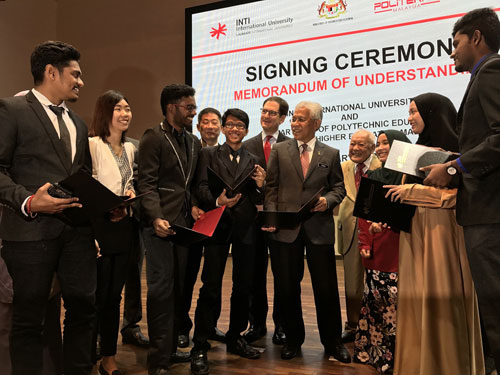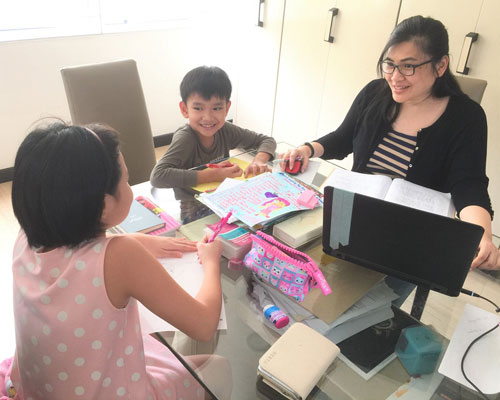Malaysia has over 660 higher education institutions and 1.2 million currently enrolled tertiary level students, creating a highly competitive job environment with skilled and educated graduates. With easier access to higher level education, expectations on the quality of the workforce is greater and a bachelor’s degree may not be enough to differentiate employees from the sea of almost 200,000 other graduates yearly.

Mr. Timothy Bulow, CEO of INTI, and Dato’ Seri Idris Jusoh, Higher Education Minister talk with INTI students.
Recognising and acknowledging lifelong learning as one of the key pillars of talent development, the Ministry of Higher Education (MOHE) has been pushing for flexi-education options to empower working adults to pursue a further education. Shift 3 of the Malaysia Education Blueprint 2015-2025 (Higher Education) aims to enculture and create a ‘Nation of Lifelong Learners’.
Higher Education Minister Dato’ Seri Idris Jusoh said, “As part of the National-Level Lifelong Learning Agenda, flexible learning is a key focus of our nation’s education policy to raise the quality of our talent and produce a competent and employable workforce. We are working closely with higher education institutions to best develop solutions for Malaysians to evolve and upskill to remain relevant in today’s sophisticated and competitive job economy.”
One of the efforts under the Blueprint is the introduction of the Accreditation of Prior Experiential Learning (APEL), which recognizes previous experience such as work or relevant experience as qualification to enter university.
Under the first phase of the APEL programme, APEL (A) or APEL (Accreditation) was introduced to allow individuals without formal education qualification but have extensive experience to access tertiary level education, be it certificates, diplomas, bachelor’s degrees or master’s degrees.
The second phase, APEL (C) or APEL (Credit) allows individuals to further save time and money on their higher education by translating their experience into credits in their enrolled programmes. After the candidate has submitted a formal application for APEL (C), they will undergo a tailor-made assessment or prepare a portfolio and have their results presented to the faculty and the APEL (C) committee for final approval. The entire process takes only a month from express of interest to assessment and acceptance, with a personal advisor assigned to each candidate for guidance through the applying process.
“APEL (C) is in line with the Ministry of Higher Education’s efforts to encouraging lifelong learning by giving more flexible opportunities and democratizing access for individuals to pursue higher education.” Dato’ Seri Idris Jusoh added. “We hope to remove barriers to education for all through a series of other initiatives including the world-first credit recognition initiative for Massive Open Online Courses (MOOCs).”
Complete your MBA in just two years with APEL (C)
APEL (C) is currently available at four selected higher education institutions and is expected to expand to more by end of year. INTI International University & Colleges (INTI) is the first and only private higher education institution to be awarded APEL (C).

Lai Chai Gim, Current INTI MBA Learning Simplified student, completes her assignments at home with her children.
Commenting on this, Timothy Bulow, CEO of INTI said, “We’ve heard from many working adults that they lack time and the resources to commit to a higher education programme. From this feedback, we have designed a programme that caters to any lifestyle. Our two and a half years MBA Learning Simplified, for example, offers online-based learning and requires a commitment of only an hour a day and RM1,000 a month. APEL (C) further allows candidates to save up to 6 months through credit exemptions. Allowing them to complete their MBA in just two years.”
“Even our INTI faculty is constantly keeping up with industry developments and updating their knowledge about the current needs and demands through our Faculty Industry Attachment, a programme where lecturers undergo placements with top industry partners, “ Bulow added. “We understand that some may be hesitant to step back into academics after years away, so we provide one-on-one academic support for each APEL (C) candidate to smoothen the process from application to the assessment.”
Current INTI MBA Learning Simplified student Lai Chai Gim was the first student at INTI to be awarded APEL (C) after she applied for the two-year MBA Simplified Learning through APEL.
Lai joined the workforce after her diploma to be financially independent as she did not want to burden her parents with paying for her further education. Now she views being able to pursue and complete the higher education that she left behind years ago as a personal accomplishment.
Speaking on how she finds being back in academics again, Lai said, “As I progress into my career, I found that furthering my education helps me place a structure to my learning process and enhances my work experience to a whole new level. I find it highly enjoyable and energizing as I get to network with people from different industries and different ages. The flexible learning structure offered by INTI means that I can complete my coursework at home with my family while my children completes their school homework.”
“Preparing my portfolio for the APEL (C) assessment really helped me to document my skills and put into perspective the knowledge my years of experience have equipped me with. After all, our work experience and exposure is ingrained within us. The application process for APEL (C) merely reviews what we already know. “Lai said.
APEL (C) is currently applicable for INTI’s MBA programme in collaboration with University of Hertfordshire and MBA Learning Simplified with intakes commencing 10 June, 19 August and October 28.